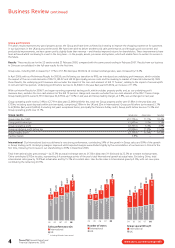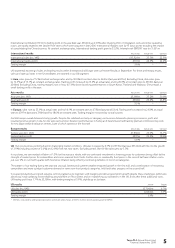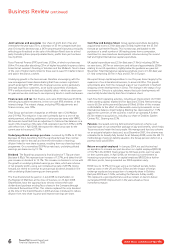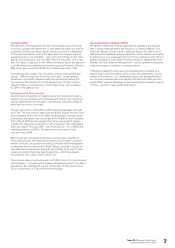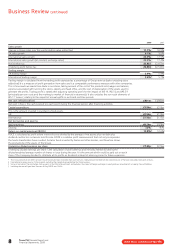Tesco 2008 Annual Report Download - page 16
Download and view the complete annual report
Please find page 16 of the 2008 Tesco annual report below. You can navigate through the pages in the report by either clicking on the pages listed below, or by using the keyword search tool below to find specific information within the annual report.
Tesco PLC Annual Report and
Financial Statements 2008
14
We have made significant progress this year on the Community Plan
and on our key objectives of being a good neighbour in the communities
we serve and being fair, responsible and honest, particularly on the
environment. This has been recognised through our continued inclusion
in FTSE4Good and Dow Jones Sustainability indices.
Environment We have made strides towards a revolution in green
consumption – incentivising the environmental option and making
it affordable.
> Through our unique Green Clubcard scheme, we have reduced carrier
bag use by over one billion, more than any other retailer, and we are on
track to save an extra billion bags in the next year. We are also on target
to sell ten million energy-efficient lightbulbs in a year as part of the
Climate Group’s ‘Together’ campaign.
> We have halved our energy use per square foot since 2000, two years
ahead of target. In the UK, the carbon intensity of our new stores opened
after 1 March 2006 has been reduced by 22% since last year. Partly
through innovations like transporting wine by canal, we have cut our
UK CO2emissions per case delivered by over 10% over the past year.
> We have invested £25m to create a Sustainable Consumption Institute at
Manchester University. Bringing together world-leading experts from various
disciplines, the Institute will help lead the way to a low-carbon economy.
> We opened our fourth UK environmental store in Shrewsbury in 2007,
and have now built environmental stores in six countries outside the UK.
Our Shrewsbury store has a carbon footprint 60% lower than a standard
store of a comparable size. It makes use of more natural light, recycled
and re-useable materials and the UK’s first fleet of battery-powered
home delivery vans. We have also invested significantly in energy-saving
technology in China, the Czech Republic, Hungary, Ireland, Poland,
Slovakia, South Korea, Turkey, Thailand and the US.
Nutrition We continued our roll-out of front-of-pack GDA nutritional
labelling across the group including Turkey, South Korea and Poland, where
33% of our products are now labelled, and Ireland, which now includes
over 5,000 labelled food items. Customers tell us they find these labels very
helpful in making informed choices. In the UK, we are still the only supermarket
where all relevant products carry the labels – over 7,000 in total – with
a further 13,000 now also carried on manufacturer-branded goods.
Community Our staff achieved our most successful ‘Charity of the Year’
ever, raising £4.4m for the British Red Cross. As well as donating £100,000
to the British Red Cross flood appeal last summer, our staff provided
essential hygiene, food items and much of the bottled water for affected
communities in key parts of the South-West.
We have opened five new regional buying offices in England, joining the
existing offices in Scotland, Wales and Northern Ireland. We introduced
1,000 new local lines last year taking the total to over 3,000. We now sell
200,000 litres of ‘localchoice’ milk each week in the UK, helping customers
to support small dairy farmers in their local area.
We have helped 1.5m people to get active this year, including through
Cancer Research UK’s Race for Life, which saw 665,000 people taking part
in 5km runs, including over 21,000 Tesco staff.
We launched a new partnership with the Football Association (FA) as
part of our plan to help two million people get active in the run up to the
London 2012 Olympics. The FA Tesco Skills Programme supports grassroots
football, inspiring children between ages 5 and 11 to get active in their
local communities. We have already delivered football coaching to over
250,000 children.
We also continue to make a difference locally through our Computers for
Schools programme which now offers ‘eco-quiet’ PCs as part of a catalogue
of over 700 products. Since the start of the scheme 16 years ago we have
given away over £118m worth of equipment. Through new store openings
and refits in China we have sponsored more than 7,000 disadvantaged
students to cover their schooling and textbooks. In Poland, half the schools
(15,000) took part in their sixth year of Tesco for Schools, whilst in Hungary,
we set up local partnerships with schools and colleges, donating around
£50,000 and contributing recycled computers.
This year, we have launched Community Plans in eight countries bringing
together a range of community, environmental and health projects,
tailored to local market needs and the remaining three will be starting
soon. A number of our more mature markets now have comprehensive
community and environment programmes. In South Korea, for example,
we have 50 culture centres in our stores which offer up to 350 different
educational and cultural programmes ranging from dance to cookery
classes.
The year ahead
> We will take the reduction of single-use carrier bags to the next level,
achieving a 50% reduction compared to 2006 by continuing to focus
on incentives rather than penalties.
> We will launch the first phase of our trial for carbon labelling our products
in the coming weeks, in conjunction with the Carbon Trust, and will help
customers become familiar with the new currency of CO2.
> We will appoint Community Champions to 50 stores. These members
of staff are dedicated to making sure that our stores reach out to more
people in local communities.
> We will support our new Charity of the Year, Marie Curie Cancer Care,
to fund an additional 125,000 hours of nursing care for terminally
ill patients.
> We will build the largest privately-funded solar facility in the
Czech Republic at our Postrizin distribution centre.
Alcohol Earlier this year we made an offer to government that we would
play a positive part in any discussions initiated by them on measures
to ensure a responsible approach to alcohol pricing and promotions.
Competition law prevents the industry from taking this forward in
collaboration. We maintain this offer and have in the meantime reinforced
our responsible ‘Think 21’ approach by giving staff further dedicated
training on responsible alcohol sales, with a particular focus on the social
and health impacts of under-age drinking. We are also talking to customers
about the role we can play in tackling problem drinking and how we can
better help them make responsible choices.
Risks and uncertainties
Introduction Risk is an accepted part of doing business. The real
challenge for any business is to identify the principal risks it faces and to
develop and monitor appropriate controls. A successful risk management
process balances risks and rewards and relies on a sound judgement of
their likelihood and consequence.
The Board has overall responsibility for risk management and internal
control within the context of achieving the Group’s objectives. Our process
for identifying and managing risks is set out in more detail from page 22
of the Corporate Governance section of this Annual Report and Financial
Statements. The key risks faced by the Group and relevant mitigating
factors are set out below.
Business strategy If our strategy follows the wrong direction or is not
effectively communicated then the business may suffer. We need to
understand and properly manage strategic risk in order to deliver long-term
growth for the benefit of all our stakeholders. Our strategy is based on five
elements: to grow the core UK business, be as strong in non-food as in
food, develop retailing services, become a successful international retailer
www.tesco.com/annualreport08
Business Review continued


